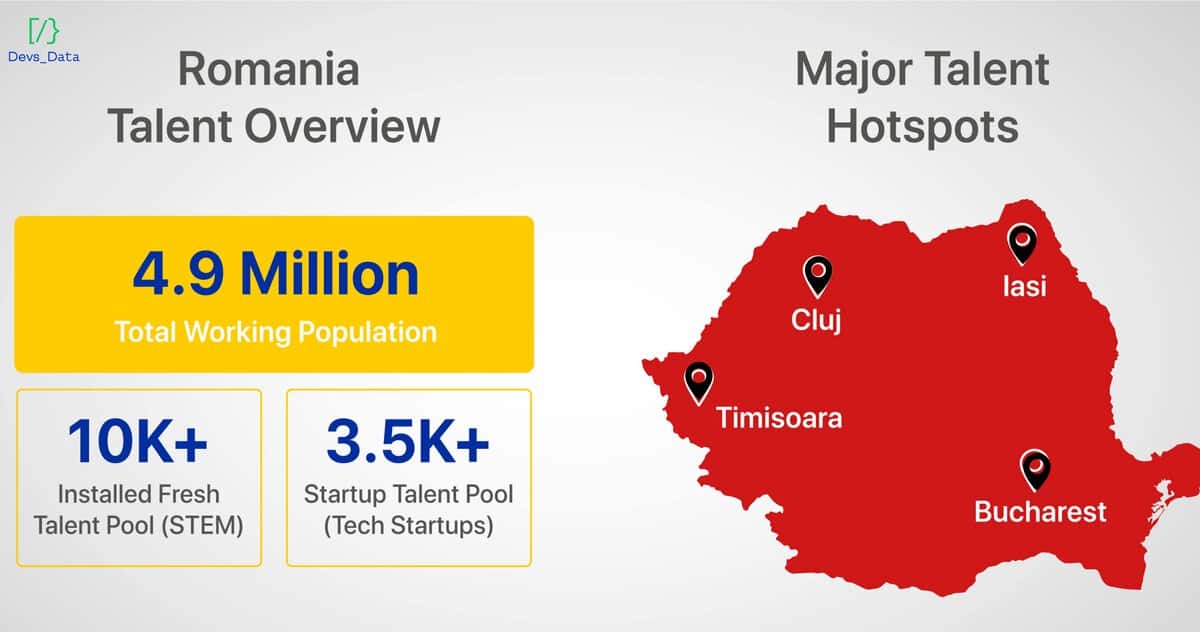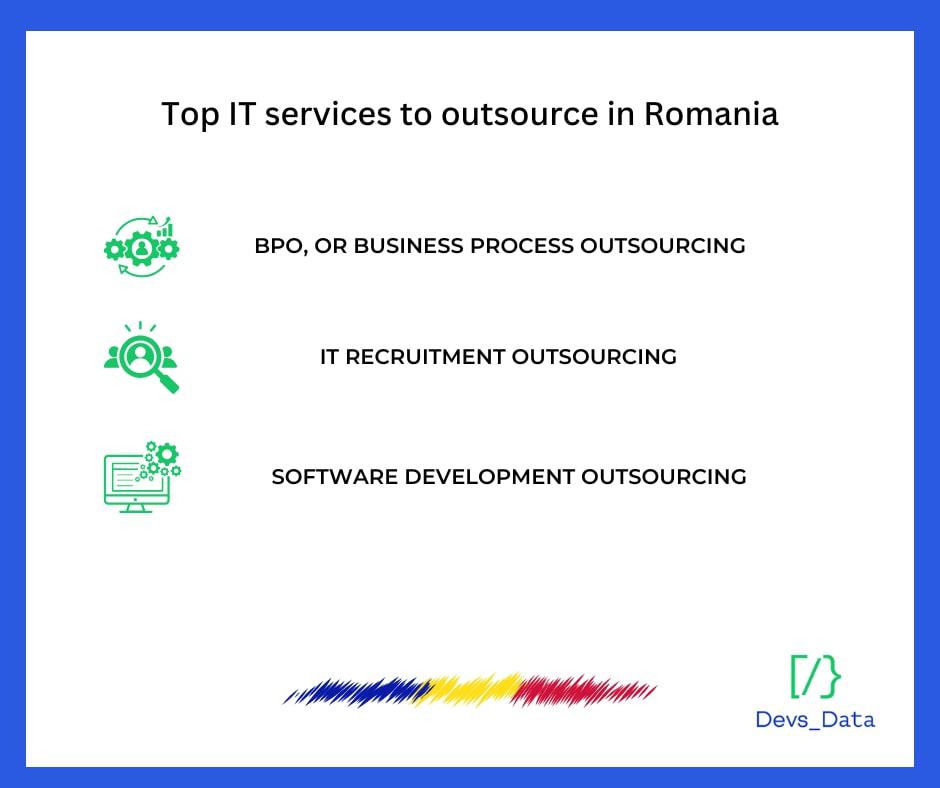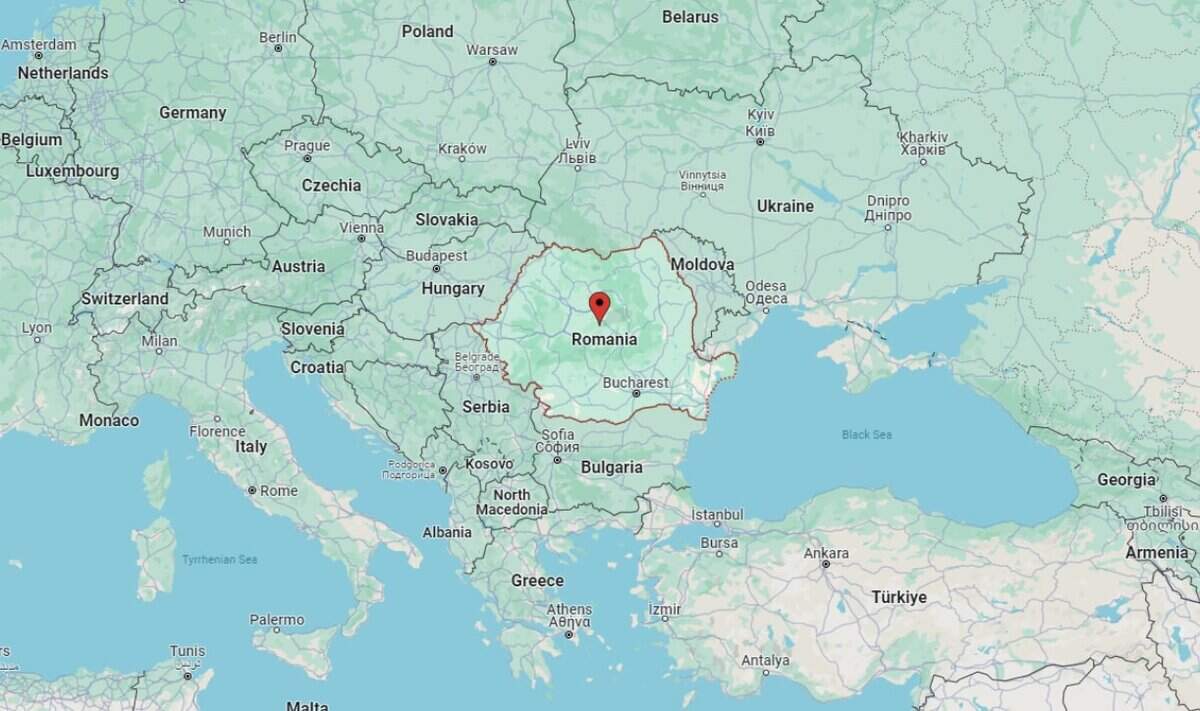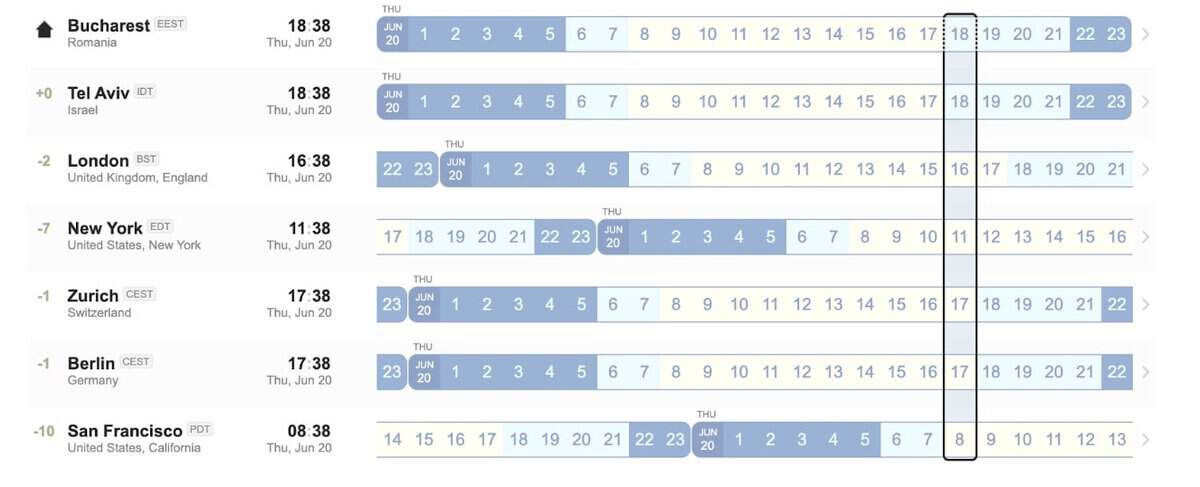


The Central University Library of Bucharest, Romania, glowing under the evening sky, accompanied by the statue of King Carol I.
Given the competitive and unpredictable global economy, businesses have started prioritizing cost optimization to remain profitable, grow through strategic investments and efficient operations, and minimize the impact of economic uncertainty. Considering all these factors, the global outsourcing market has emerged as an effective solution for companies worldwide.
Among the leading destinations, Romania stands out with its skilled workforce, competitive costs, and growing reputation as a hub for IT and business services. Ranked among Europe’s top software development markets, this Eastern European country offers cost efficiency, technical expertise, and a burgeoning business ecosystem. With two decades of steady economic growth and strong support from EU initiatives, Romania is also home to one of the fastest-growing ICT sectors in the region—backed by robust infrastructure and digital transformation programs.
This report will give a comprehensive overview of outsourcing in Romania for 2025, focusing on industry trends, data, and, more importantly, why this Eastern European country might interest you.

To understand why Romania stands out as a premier outsourcing destination, it’s essential to first look at its broader economic trajectory and the strength of its ICT sector. Together, these factors lay the foundation for the country’s growing role in the global tech landscape.
Over the last 2 decades, Romania has transformed into one of the fastest-growing economies in Eastern Europe. Since joining the European Union in 2007, the country has benefited from EU-backed investment, trade integration, and macroeconomic stability. GDP growth has averaged 3–4% annually over the past ten years, supported by a favorable business climate, increasing foreign direct investment, and a maturing private sector.
In addition to its stable macroeconomic fundamentals, Romania consistently ranks high in key business environment indicators, including ease of doing business, regulatory transparency, and infrastructure accessibility. The country offers a predictable legal framework aligned with EU standards, as well as modern banking and digital services that make it easier for foreign companies to set up and scale operations.
Its strategic location within the EU makes Romania a natural bridge between Western European economies and neighboring Eastern markets. Combined with competitive labor costs, a multilingual workforce, and a rapidly evolving digital infrastructure, Romania continues to strengthen its position as a regional IT and business services hub. These advantages make it especially attractive for global companies seeking to establish resilient, compliant, and cost-effective technology teams in Eastern Europe.
The Information and Communications Technology (ICT) sector is one of Romania’s most dynamic and high-potential industries. From 2017 to 2021, the ICT sector grew by an average of 8% annually, and the country’s digital economy is projected to reach €52 billion by 2030, contributing nearly 10% to GDP.
Key indicators:
The Romanian government has also launched strategic initiatives under the National Recovery and Resilience Plan (NRRP), including:
Tech hubs such as Bucharest, Cluj-Napoca, Iași, and Timișoara are central to this growth, driven by a strong university ecosystem and global partnerships. These cities host R&D centers and innovation clusters specializing in software, AI, cybersecurity, and cloud technologies.
Romania leads Europe and ranks 6th globally in certified IT specialists per 1000 residents, surpassing both the United States and Russia, according to the International Trade. By outsourcing to Romania, businesses will gain access to a pool of highly skilled developers proficient in diverse technologies, from foundational programming languages like Java, JavaScript, C#, and Python to modern frameworks such as React and Angular.
Beyond these core competencies, Romania is gaining international recognition in high-impact fields such as cybersecurity and artificial intelligence (AI):
According to the National Institute of Statistics, Romania has a strong ICT (Information and communication technology) education sector, with over 40000 students enrolled and more than 9300 graduating annually. Most graduates come from Bucharest, followed by Cluj-Napoca and Iași. With nearly 7000 professionals graduating yearly from 59 specialized institutions and top universities like the University of Bucharest and Babes-Bolyai University, Romania continues to supply a growing pool of highly skilled IT talent.
This inflow of skilled graduates, combined with the country’s innovation-driven environment, supports its thriving tech hubs and startup ecosystem, making Romania an attractive destination for global software businesses seeking top-tier development qualifications.
In addition to technical skills, language proficiency plays a crucial role in successful outsourcing partnerships. Romania ranks among the top non-native English-speaking countries in Europe and ranks second only to Poland in English skills among Eastern European software developers, according to the Coursera Global Skills Report 2024. This puts Romanian engineers ahead of peers in countries like Czechia, Hungary, and Ukraine.
According to the EF English Proficiency Index, Romania ranks 12th globally and 10th in Europe, with a score of 593, placing it in the ‘High Proficiency’ band. English is widely used as the primary working language in Romanian tech companies, particularly in outsourcing firms and development hubs. Cities like Bucharest, Cluj-Napoca, and Iași are especially strong in this regard, making Romania a low-friction option for global clients seeking alignment in both code and communication.
One of Romania’s key advantages is its exceptional price-to-quality ratio. While many outsourcing destinations force companies to choose between affordability and technical skill, Romania manages to deliver both. The country offers highly educated IT professionals at a fraction of Western labor costs—without compromising on performance or expertise.
To illustrate the difference, mid-level software engineers in the United States typically earn between $94000 and $154000 annually, depending on experience, specialization, and location. In contrast, Romanian software engineers earn between $18900 and $37800 USD per year, based on current exchange rates and market benchmarks. This substantial cost difference allows companies to scale engineering teams efficiently while maintaining strong development standards.
Do you have IT outsourcing needs?
There are more than 7000 IT companies in Romania, about 340 of which are software development-related. Offering services including bespoke software development, IT consulting, web development, technical support, cybersecurity, and mobile app development, these businesses operate across different industries, including business services, healthcare, financial services, and eCommerce.
Romania’s startup ecosystem is similarly remarkable, with more than 1500 companies, scale-ups, venture capitalists (VCs), and private equity firms. With over 60 investment rounds in start-up companies, Romania has over 100 incubators and accelerators. Romanian tech companies like UiPath, FintechOS, TypingDNA, Druid, Elrond, and 123FormBuilder are gaining recognition for their impressive success stories.
Importantly, Romania’s digital economy is set to gain even more momentum through the country’s National Recovery and Resilience Plan (NRRP), funded by the EU’s Recovery and Resilience Facility. With a total value of €28.5 billion, the plan earmarks over 21% for digital transition efforts, including the modernization of public services, the creation of a secure government cloud, and support for the digitalization of education, healthcare, and administrative infrastructure. For instance, €1.4 billion is allocated to digitalize public administration, and €1.16 billion is set aside to transform Romania’s education sector with advanced digital tools and platforms. These reforms are designed to close connectivity gaps, increase digital literacy, and improve Romania’s cybersecurity and IT capacity—further boosting its attractiveness for tech investment and innovation.
Romania’s startup ecosystem ranks 44th globally and 8th in Eastern Europe, serving a population of 19.6 million and showcasing its growing impact on the global tech landscape.
As Romania’s capital and largest city, Bucharest is the epicenter of the country’s IT industry. Holding 63% of Romania’s software development revenues, the city is home to both established firms and agile midsize companies. Bucharest is ranked 16th among Europe’s largest tech hubs and 4th in Central and Eastern Europe (CEE).
The IT companies in Bucharest serve industries like business services, finance, eCommerce, and healthcare. With major tech firms such as Google, Microsoft, Amazon, Oracle, Dell, and Adobe, Bucharest remains a top outsourcing choice for global enterprises.
With over 220000 IT professionals, Romania has a successful tech industry, with talent working remotely, freelancing, or employed by international firms. Cities like Cluj-Napoca build globally-minded ecosystems, pushing innovation and growth beyond the capital.
The city is well-known for its AI-driven solutions, IT-managed services, and online and mobile app development. The industries that Cluj-Napoca’s IT companies serve are dominated by information technology, but they also have experience in business services, eCommerce, banking, and healthcare. Cluj-Napoca continues to be a popular location for software development projects because of its talent pool and emphasis on cutting-edge technologies.
Timișoara is becoming well-known as one of Romania’s new IT hotspots, pulling in foreign capital and creating a welcoming atmosphere for freelancers and startups. The city’s emphasis is on innovative city projects, which include digitalization, sustainability, and mobility.
Timișoara has a talent pipeline, with more than 50000 students enrolled in its universities. Coworking facilities like Cowork Timișoara, which assist entrepreneurs and work with the Timisoara Innovation Labs accelerator, help the city’s startup environment, becoming a technological advancement and entrepreneurial ingenuity thanks to initiatives like these.
Iași, Romania’s second-largest city, is undergoing rapid technological transformation. From a post-industrial center, it has grown into a booming IT hub with modern tech parks and innovation labs. The city is recognized for its strong educational institutions, making it a rich source of top-tier IT talent. Tech giants like Amazon, Oracle, and Accenture have set up operations in Iași.
While Romania offers compelling advantages for outsourcing, there are a few key challenges businesses should consider to ensure smooth operations and successful long-term collaboration.
For foreign IT companies outsourcing to Romania, deciding how to collaborate with Romanian developers often comes down to two main options: Employment contracts or B2B contracts. Still, it has its own regulations regarding forms and taxes.
The country’s labor laws dictate the terms of employment contracts in Romania. These contracts require mandatory contributions to social insurance, health insurance, and a 10% income tax. However, under Romanian law (No. 1168/2017), eligible programmers can receive a tax rebate of up to 10% on their income tax payments.
Alternatively, developers can work on a B2B basis by registering as sole proprietors to provide IT services. There are two primary options for this:
Developers pay just 1% in income tax, provided they meet certain criteria. In some cases, the tax rate can increase to 16%, depending on the company’s structure and revenue.
Developers are taxed at 10% and must make mandatory social contributions.
Navigating these tax structures and ensuring compliance with Romanian and EU regulations can be complex. Engaging with local accounting firms can provide valuable assistance in this regard. Reputable firms such as Baker Tilly Romania offer comprehensive services, including audit, tax consultancy, and financial reporting. Additionally, Romanian Accountants specialize in supporting foreign investors with services ranging from VAT registration to payroll and human resources management.
While Romania ranks high in English proficiency, with a global ranking of 12th and a “High Proficiency” band according to the EF English Proficiency Index, linguistic fluency doesn’t always guarantee cultural alignment. Outsourcing relationships thrive on more than language—they require shared expectations around feedback, hierarchy, deadlines, and autonomy.
For example, Romanian developers are often trained in strong technical execution. Still, they may not be as assertive in offering unsolicited suggestions or challenging client assumptions—something that U.S. or Western European teams may expect. Without a strong onboarding framework, this can lead to misunderstandings or a lack of alignment in Agile team structures.
Romania’s major tech hubs—like Bucharest, Cluj-Napoca, and Iași—host many local and international companies, creating strong competition for top-tier developers. While the talent pool is large, the best engineers are often in high demand, which can affect hiring timelines, salary expectations, and retention if not managed strategically.
Romania’s regulatory environment is relatively business-friendly, with a 16% corporate tax rate and a flat 10% personal income tax. However, outsourcing companies must also navigate strict EU-wide regulations, especially the General Data Protection Regulation (GDPR), which governs how personal and sensitive data is handled.
Failure to comply can lead to hefty fines up to €20 million or 4% of annual global turnover, so even small outsourcing engagements must include data processing agreements (DPAs), clear IP clauses, and alignment on cross-border data storage.
Additionally, depending on the collaboration model (employee vs. contractor), businesses must account for labor code differences, tax residency rules, and double taxation agreements.
Now that the main benefits and difficulties of outsourcing in Romania have been discussed, let’s compare this country to other well-known Eastern European destinations.
According to the data, Poland has the region’s biggest pool of tech talent, with 607000 workers. Romania, in third place, is comparable to Czechia in terms of its workforce size.
In the Coursera Global Skills Report 2024, Romania ranks seventh in coding proficiency, lagging somewhat behind its regional counterparts. However, Romanian software engineers stand out in English language skills—second only to Polish developers—surpassing many other Eastern European countries.
Despite the gap in coding rankings, Romania maintains strong positions in other key areas. It consistently ranks high in terms of business climate, ease of doing business, and accessibility. Its strategic location in Europe, competitive labor costs, and growing reputation as a regional IT hub further enhance its attractiveness for global companies.
Romania is a more cost-effective choice compared to Poland. For example, the median yearly compensation for a mobile app developer in Romania is over $37000, whereas in Poland, it is roughly $48000.
Here’s a quick comparison of average salaries for various tech professions across Romania and other Eastern European countries, calculated based on data from Glassdoor, Levels.fyi, and Payscale.
| Positions | Role | Romania | Ukraine | Poland | Czechia |
|---|---|---|---|---|---|
| Backend | Software Developer | $45000 | $45000 | $45000 | $45000 |
| Frontend | Software Developer | $42000 | $40000 | $44000 | $40000 |
| Full Stack | Software Developer | $50000 | $47000 | $52000 | $53000 |
| Mobile | App Developer | $37000 | $35000 | $37000 | $33000 |
| AI | Engineer | $42000 | $40000 | $42000 | $57000 |
| DevOps | Developer | $52000 | $42000 | $52000 | $45000 |
| Blockchain | Developer | $56000 | $58000 | $56000 | $60000 |
Developer salaries were converted to US dollars at a relevant exchange rate for August 2023.
Do you have IT outsourcing needs?
Start by identifying which parts of your software development lifecycle or IT operations could benefit from external support. Outsourcing doesn’t have to be limited to entire projects or one-off tasks—it can also encompass long-term partnerships like managed services, ongoing maintenance, or scaling specialized functions such as DevOps, QA, or cloud infrastructure.
This approach works equally well for both tech and non-tech companies. In fact, even highly technical organizations frequently outsource parts of their development process to improve scalability, access niche expertise, or speed up delivery.
If you want more control while still leveraging external resources, consider models like Recruitment Process Outsourcing (RPO) or building a dedicated development team with the help of a local partner. This allows you to retain strategic direction while relying on experienced recruiters to source, vet, and onboard top-tier talent tailored to your needs.
When outsourcing software development, it’s important to evaluate both the payment model and the team structure that best suit your project’s goals, budget, and timeline.
These define how vendors are paid and are typically tied to how well-defined the scope and deliverables are:
These describe how the external team is organized and integrated into your operations:
Choosing the right outsourcing partner is one of the most critical decisions in your software development strategy. Beyond technical capabilities, your vendor should have a deep understanding of the local talent market, a strong operational framework, and a clear, transparent approach to delivery and collaboration.
Look for partners who can:
DevsData LLC exemplifies these qualities. With over eight years of experience, a network of 65000+ pre-screened specialists, and operations across the US, Europe, and LATAM, the company helps businesses build and scale elite engineering teams with speed and confidence. As a government-authorized recruitment and staffing provider, DevsData LLC operates on a success fee model—minimizing financial risk while ensuring performance-driven outcomes.
Whether you’re looking for end-to-end software delivery or building a long-term development center in Romania, partnering with an experienced firm like DevsData LLC can simplify the journey, reduce operational friction, and help unlock the full potential of Eastern Europe’s tech ecosystem.

If you’ve already decided to choose Romania as your outsourcing destination, you’ll find a wide range of service models that go beyond traditional development outsourcing. Here are five core areas where companies typically engage Romanian partners:
1. Business process outsourcing (BPO)
IT businesses often outsource non-core business functions when founding offshore operations. Companies can focus on product development by entrusting tasks like tech recruitment, HR management, employer branding, payroll processing, legal compliance, and equipment procurement to local providers. BPO services can also extend to front-office roles, including marketing, customer support, and software development. For product-focused companies, prioritizing core activities over delegation is often the key to success.
2. IT Recruitment outsourcing
Another top service in Romania for IT companies looking to expand there is IT recruitment outsourcing, which offers a streamlined way to build high-performing teams. Partnering with a local recruitment firm will ensure access to experienced engineers, competitive salary structures, and expert guidance on the local talent market. This approach will also cover the full recruitment process, from identifying top candidates to onboarding.
3. Software development outsourcing
Romania has more than 300 IT outsourcing providers offering software development services. While outsourcing is a popular way to scale quickly, it’s important to consider the risks, including unclear pricing, data security issues, less control over projects, and potential concerns from investors. Establishing their engineering team in Romania can be a smarter alternative for companies seeking a balance between cost efficiency and control. This approach allows businesses to directly manage development processes, maintain tighter security protocols, and ensure alignment with long-term strategic goals while leveraging Romania’s skilled IT workforce and competitive market dynamics.
4. Research & development (R&D) outsourcing
Romania’s strong academic base and growing ecosystem of deep-tech startups make it an ideal destination for innovation-driven outsourcing. Companies can establish R&D units focused on AI, ML, blockchain, or IoT, leveraging Romania’s cost advantages while working on cutting-edge solutions and proprietary technologies.
R&D outsourcing here is not about routine development—it’s about creating long-term intellectual property and fueling the innovation pipeline.
5. Quality assurance & testing services
Romania also offers highly specialized QA and software testing services, often delivered by dedicated teams. These services include:
QA teams in Romania are frequently integrated with international product teams, helping ensure consistent quality across distributed development environments. Many providers follow international QA standards and have certifications in ISO and ISTQB frameworks.
Website: www.devsdata.com
Team size: ~60 employees
Founded: 2016
Headquarters: Brooklyn, NY, and Bucharest, Romania
DevsData LLC, a premier IT recruitment firm in Romania, has spent the past decade establishing itself as a trusted partner in tech hiring. With a robust network of over 65000 thoroughly vetted Romanian IT specialists, the firm excels in connecting top-tier professionals with roles that align with their expertise and career aspirations. Among its talent pool are Google-level engineers and developers with 10+ years of experience in key technologies such as artificial intelligence (AI), machine learning (ML), Big Data, cloud computing, and cybersecurity—ensuring clients gain access to some of the industry’s best minds.
Beyond recruitment, DevsData LLC’s influence extends to the broader software development landscape. The company collaborates with global enterprises and dynamic startups from regions such as the US, Poland, Israel, and Germany. As a government-authorized recruitment and staffing provider, it operates on a success-fee-only model—clients pay only upon satisfaction with the hire during the guaranteed period, eliminating upfront costs and financial risk.
What truly sets DevsData LLC apart is its capacity to go beyond traditional hiring. The firm supports businesses entering the Romanian market with essential legal guidance on contract establishment, offering a seamless integration into the local tech ecosystem. Notable partnerships with brands like Varner, Cubus, and Novartis reflect its dedication to fostering long-term client success.
In an oversaturated IT recruitment landscape, DevsData LLC stands out by delivering the quality of a large firm with the flexibility and tailored approach that big agencies often lack. With over 100 successful projects across various industries, they have consistently earned top ratings on platforms like Clutch and GoodFirms.
DevsData LLC collaborated with a Silicon Valley FinTech business to create a breakthrough payment processing technology. The technology improved cross-border transactions between Latin America and the United States by drastically decreasing processing times and transaction costs. This initiative demonstrates their capacity to apply localized experience to global innovation. More information on this achievement can be found in their case studies section.
DevsData LLC’s reliable services and unique approach make it a trusted partner for outsourcing to Romania, whether your organization is a startup or an established enterprise. For more information, contact DevsData LLC at general@devsdata.com or visit their website at www.devsdata.com.

Paying contractors from Romania while complying with local laws is essential. One effective method is to use the employer of record service. Here are some EoR companies that can help with legal payment procedures and navigating Romania’s employment laws:
DevsData LLC is a trusted employer of record (EoR) provider specializing in the IT and tech sectors. The company delivers comprehensive employment solutions designed specifically for tech companies aiming to grow their operations in Poland.
As an EoR, DevsData LLC manages employment compliance, payroll processing, and business HR administration. This enables companies to establish a presence in Romania without creating a legal entity, and the firm ensures full compliance with local labor laws. It’s crucial to be well-informed about efficient money transfer methods.
For international transfers, consider platforms like Payoneer and Wise, which offer reliable and smooth transaction services.
Knowing the time zone differences between cities is essential to ensuring effective communication, streamlining meeting scheduling, and facilitating seamless global collaboration.

| Destination | Bucharest |
|---|---|
| Zurich | Bucharest is 1 hour ahead |
| Berlin | Bucharest is 1 hour ahead |
| London | Bucharest is 2 hours ahead |
| New York | Bucharest is 7 hours ahead |
| San Francisco | Bucharest is 10 hours ahead |
To call Romania from the US, follow these steps:
The dialing sequence should look like 011 + 40 + area code + local number.
For example, if you are calling a number in Bucharest (area code 21) and the local number is 1234567, you would dial 011-40-21-1234567.
Romania’s IT sector taxes are relatively advantageous compared to other European countries. Romania’s corporate income tax rate is 16%, one of the lowest in Europe, making the country an appealing option for foreign companies. The standard VAT rate in Romania is 19%, with 9% and 5% reduced rates applying to specific goods and services. Romania applies a flat tax rate of 10% on personal income.
Additionally, IT professionals who meet specific criteria can benefit from a 0% income tax rate on their salary. To qualify for this exemption, IT professionals must hold a relevant university degree, earn a gross monthly salary of at least twice the average gross wage in Romania from the previous year, and work for a certified IT company recognized by the Romanian government.
Employers in Romania are obliged to contribute to the country’s social security system, which covers health insurance, pension insurance, and disability insurance. The total social security contribution rate amounts to 37.25% of the employee’s gross salary, split between the employer (23.75%) and the employee (13.5%).
Romania is home to several prestigious universities that produce highly skilled graduates, particularly in engineering, technology, and computer science. With a strong emphasis on technical education and research, these institutions play a crucial role in shaping the next generation of software engineers, data scientists, and IT specialists. Here are some of the leading tech-focused universities in Romania:
As one of Romania’s top technical universities, Politehnica University of Bucharest is renowned for its rigorous engineering programs and technological research contributions. The university produces highly skilled professionals in computer science, automation, electronics, and telecommunications, preparing graduates to meet the global demand for top-tier engineers.
Recognized for its cutting-edge research and industry partnerships, the Technical University of Cluj-Napoca specializes in computer science, information technology, and electrical engineering. Its graduates are well-equipped for careers in software development, AI, and emerging tech fields, making them valuable assets for global tech companies.
With a strong emphasis on engineering and applied sciences, Gheorghe Asachi Technical University of Iași is a key player in Romania’s STEM education. Its graduates excel in mechanical, electrical, and software engineering, contributing to both academic research and the private sector.
These universities provide world-class technical education, ensuring that Romania remains a key hub for tech talent in Europe and beyond.
Do you have IT outsourcing needs?
Outsourcing software development to Romania offers numerous advantages, such as competitive pricing, highly skilled IT professionals, and a growing tech ecosystem. However, it’s essential to approach the process with a clear strategy to ensure success.
To make outsourcing to Romania more effective, businesses should:
Partnering with an experienced recruitment agency can simplify this process, providing access to the best talent and ensuring the business remains compliant with local regulations.
For more information, contact DevsData LLC at general@devsdata.com or visit their website at www.devsdata.com.
Frequently asked questions (FAQ)
DevsData – your premium technology partner
DevsData is a boutique tech recruitment and software agency. Develop your software project with veteran engineers or scale up an in-house tech team of developers with relevant industry experience.
Free consultation with a software expert
🎧 Schedule a meeting
FEATURED IN


DevsData LLC is truly exceptional – their backend developers are some of the best I’ve ever worked with.”
Nicholas Johnson
Mentor at YC, serial entrepreneur


 Build your project with our veteran developers
Build your project with our veteran developers
 Explore the benefits of technology recruitment and tailor-made software
Explore the benefits of technology recruitment and tailor-made software
 Learn how to source skilled and experienced software developers
Learn how to source skilled and experienced software developers




Categories: Big data, data analytics | Software and technology | IT recruitment blog | IT in Poland | Content hub (blog)
